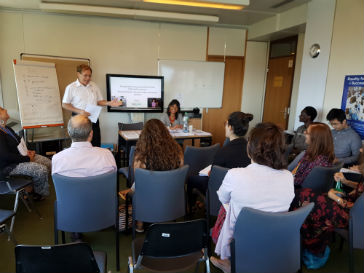ILO celebrates the International Day of Cooperatives by focusing on workers in the informal economy
The United Nations’ International Day of Cooperatives (IDC) is held annually on the first Saturday of July. For this occasion, the ILO organised an event, recognizing the theme of the 2017 IDC, “cooperatives leave no one behind”, with a focus on the role and potential of cooperatives and other social and solidarity economy organizations and enterprises providing a pathway to formalization for those working in the informal economy. The event was also an opportunity to launch a new report by the ILO and WIEGO, titled “Cooperation among workers in the informal economy: A focus on home-based workers and waste pickers”.

Simel Esim, the Head of the Cooperatives Unit at the ILO then presented the main findings of the ILO-WIEGO report on cooperation among home-based workers and waste pickers. The findings demonstrate how cooperatives and other forms of economic organizing benefit the workers by providing market access as well as various forms of training on technical, legal and advocacy skills, among others. Furthermore, cooperatives provide voice and recognition to the workers in the informal economy, particularly in negotiations with both buyers and intermediaries as well as with government at different levels for social benefits and improved conditions. At the same time, these cooperatives face numerous challenges related to markets, policies and internal issues, which will still need to be overcome to further improve the situation of the workers and to support their transition to the formal economy. The summary of key findings is available here, with the full report to be published shortly.

In the ensuing discussion, Ms Dias emphasised the need for an integrated approach to formalization of the workers in the informal economy, where waste pickers can work and be treated as workers already prior of having a formal status. She highlighted the role of both national and local governments through the provision of an enabling environment, and how cooperatives help break the challenges waste pickers face to their livelihoods, recognition and rights. Finally, Ms Dias stressed the role of cooperatives in monitoring and preventing child labour in waste management – the best way of getting children away from the waste dumps to education is through the integration of cooperatives in the municipal waste management systems.